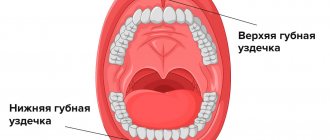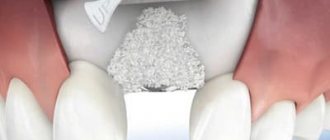But if surgical plastic surgery of the frenulum is still performed, then in our clinic it is only laser surgery.
This method has a number of advantages:
- smaller volume of anesthetic;
- the manipulation lasts only 10 – 15 minutes;
- the edges of the wound are instantly “sealed” (due to gluing the end sections of the vessels under the influence of the laser), which prevents bleeding;
- no need for stitches;
- 100% sterility of the surgical field, which eliminates the risk of complications;
- faster healing, facilitating the postoperative period.
What is lingual frenuloplasty?
The frenulum is a small membrane that connects the lower part of the tongue and the mucous membrane of the lower jaw. Despite its small size, it performs very important functions: it is responsible for the formation of dental occlusion, controls the mobility of the tongue and the functioning of the facial muscles.
There are three main pathologies of the tongue frenulum that require surgical correction.
- Wrong shape.
A healthy frenulum is a fold of mucous membrane in the shape of an arc. - Small size
(in medical terminology - ankyloglossia). The average length of the frenulum of the tongue in an adult is 3 centimeters; in a child it is shorter. In the case of ankyloglossia, the frenulum will not allow the tongue to be raised completely upward. - Incorrect mounting location.
A healthy frenulum is attached to the middle of the tongue, and with pathology it can be shifted to the tip.
In some cases, it becomes necessary to perform plastic surgery of the lip frenulum - the fold of mucous membrane connecting the lip and gum. The operation is performed to avoid impaired diction and the formation of malocclusion. Read more about lip frenuloplasty here.
Causes of tongue frenulum anomaly
Most children have mild pathology, but severe forms are also not uncommon. The size of a child’s tongue frenulum is most often determined by heredity, as well as the following factors:
- viral infection in the mother in the first and last trimesters;
- late toxicosis;
- exacerbation of chronic diseases during pregnancy;
- injuries in the abdominal area during gestation;
- taking potent drugs by the expectant mother.
Symptoms of a shortened frenulum
How to determine if your baby needs surgery? It is necessary to seek specialist advice. However, you can notice signs of a defect in the frenulum of the tongue yourself by paying attention to some details.
- The frenulum resembles a transparent film and does not have a vascular network.
- The tongue is inactive.
- The child cannot reach the upper palate with the tip of his tongue.
- When you move your tongue, clicks are heard.
- Chewing and swallowing are difficult.
- Diction is broken.
- The lower front teeth are turned towards the tongue.
How to check if a child has a short frenulum
The presence of difficulties with the frenulum can be easily determined independently:
- Open your mouth slightly and place the tip of your tongue in the area behind your upper teeth. In this position, the place of attachment of the frenulum is clearly visible. If it is not “where it needs to be,” it is difficult to lift the tongue up.
- Pull your tongue forward. A short frenulum does not allow this to be done; in addition, the tip of the tongue visually looks forked
- Open your mouth and try to touch your upper lip with your tongue and lick it. Difficulties with the bridle make this movement difficult to perform.
Please note: sometimes a child cannot cope with these exercises not because there is something wrong with the frenulum. The cause may be weak muscles of the articulatory apparatus. Take a clean handkerchief and try to help your tongue. If resistance is felt when moving, then the problem is still in the hyoid frenulum.
When and who needs tongue frenuloplasty?
Most often, an abnormality of the frenulum of the tongue can be diagnosed in a child immediately after birth. Then it is recommended to fix it. However, plastic surgery is performed on children of preschool and school age, as well as adults. The operation is indicated in the following cases.
- Violation of sucking in newborns.
If babies have a tongue frenulum that is too short, they cannot latch onto the nipple properly, resulting in underweight, fussiness, and poor sleep. - Diction defects.
Due to poor tongue mobility, children distort some sounds, especially “r”, “l” and hissing sounds. As a rule, the problem is discovered by a speech therapist in preschool age. - Abnormal shape of teeth and gums.
A tongue frenulum that is too short can interfere with proper growth of the lower jaw. This leads to incorrect positioning of the front teeth and gum recession. - Preparation for implantation and prosthetics.
Any deviations in the shape of the soft tissue from the norm can ultimately lead to implant failure, so they need to be corrected before surgery. The discomfort caused by the pathology of the frenulum of the tongue during the use of removable dentures, especially on the lower jaw, is also important: the structures simply fall out when talking or eating.
What happens if tongue frenuloplasty is not performed in children?
An abnormality of the frenulum of the tongue in children provokes the following serious consequences.
- Due to a violation of the sucking regime in infancy, the child may not receive enough nutrition and, as a result, lag behind in development.
- Children with tongue frenulum abnormalities may never learn to pronounce some sounds.
- Incorrect placement of the frenulum leads to underdevelopment of the lower jaw, resulting in the formation of an incorrect bite.
If pathology of the frenulum of the tongue has been identified in a newborn, it can be easily corrected by making an incision with a laser. At this age, you won't even need stitches. With age, the structure of the frenulum becomes more complex, new vessels appear in it, so plastic surgery of the frenulum in preschool and school-age children turns into a full-fledged surgical operation. Therefore, it is best to do it at the age of 5-6 years, when the child’s milk teeth are replaced by permanent ones.
Parents can determine whether their child needs surgery on their own. To do this, ask him to reach the upper palate with the tip of his tongue. If he cannot do this, or it hurts, he should consult a doctor.
Indications for surgery
Abnormal frenulum length is corrected surgically. Surgery at an early age is indicated in the following cases:
- when the baby has difficulty sucking the breast;
- when a child begins to develop an abnormal bite;
- when a displacement of the dentition occurs in the baby’s oral cavity;
- even if the speech therapist cannot help the child correct speech defects.
Up to a year, the frenulum is cut with scissors and stitches are applied if necessary. The operation is performed quickly and painlessly, since there are no nerve endings in the frenulum.
Preschoolers and children of primary school age also have their frenulum cut, but a little differently. The frenulum is cut with a special scalpel, and the attachment site is moved to another place and sutures are applied.
Teenagers' bridles are not cut. A speech therapist works with them, and the dentist prescribes special exercises to stretch the frenulum.
Correction of the frenulum can also be indicated for patients in adulthood (at one of the stages of orthopedic treatment).
Operation techniques
There are two methods of performing tongue frenuloplasty: traditional (classical) and laser. This is a more modern and safer method. The laser allows the operation to be performed with great precision and does not cause bleeding after the procedure. In addition, there is no need for stitches, and healing time is significantly reduced. This is especially important if you need to perform laser frenuloplasty on a child: the baby will tolerate the procedure much easier.
Depending on what pathology of the frenulum is detected, the doctor uses one of three techniques: cuts the frenulum, removes it, or changes the attachment site. The number of cuts and their shape depend on the choice of technique.
Indications and contraindications for frenulum correction
The following are considered good reasons to undergo frenuloplasty:
- inability to breastfeed;
- the presence of a wide, shortened frenulum, its splitting;
- inflammatory processes of the periodontium due to incorrect position of the tongue, caries, bite pathology due to a short frenulum;
- sound pronunciation defects in children that cannot be eliminated conservatively;
- preparation for orthodontic and orthopedic dental procedures.
In adults, the most common reason for frenuloplasty is periodontal disease, although it happens that a lisp, not eliminated in childhood, brings an adult patient to the surgeon.
In each case, indications for tongue frenuloplasty are assessed individually, taking into account the patient’s age and symptoms. If you refuse treatment when it is really needed, an abnormal frenulum will lead to bite defects, burr, and provoke caries and periodontal inflammation.
Tongue frenuloplasty cannot be performed if:
- acute infectious diseases of a general nature (respiratory viral, intestinal infections, etc.);
- blood clotting pathologies;
- malignant tumors;
- acute inflammatory changes in the mouth;
- systemic connective tissue diseases;
- acute caries;
- mental illnesses.
The timing of surgery in children is a controversial issue. Many experts prefer to do it to newborn babies who have not left the walls of the maternity hospital, citing the fact that immediately after birth, the mucous fold under the tongue has little blood supply and is devoid of nerve endings, which means that the manipulation will be low-traumatic and painless. In addition, the newborn will certainly not remember what happened and will not experience psychological trauma, which may well occur if the child is already 6-7 years old and he is naturally afraid of any medical procedures. If the frenulum was not cut in the maternity hospital, but in the process problems arise with feeding in the first year of life, the pediatrician will advise you to consult a surgeon, who can refer you for plastic surgery in the first months of life. In cases where signs of an abnormally short frenulum make themselves felt in older children during the formation of speech and pronunciation of sounds, experts prefer not to rush, paying maximum attention to conservative measures (exercises, classes with a speech therapist). Only if conservative treatment is ineffective and there are persistent speech therapy problems, the frenulum will be dissected before school. For adults with frenulum anomalies, there is no age limit for the operation. If pathology interferes with normal life activities, there is caries, problems with the pronunciation of certain sounds, then there is no point in postponing intervention.
Therapeutic exercises
There are alternative methods that allow you to do without surgery, for example, a set of special exercises for developing the frenulum of the tongue.
- Reach alternately to the upper and lower lips.
- Extend your tongue and make pendulum movements from cheek to cheek.
- Suck your tongue to the roof of your mouth and let go, imitating a horse clopping its hooves.
- Place your tongue on each cheek with your mouth closed.
- Smile with your mouth open.
- Stretch your lips.
- Pull your lips into a tube, pretending to kiss.
To achieve results, you need to perform the exercises every day for 5 - 10 minutes. It is important to remember that this method is suitable for correcting mild disorders; more severe pathologies require surgical intervention.
Price for plastic frenulum of the tongue
The cost of this procedure usually consists of the cost of consultation and examination, local anesthesia and the service itself. This is a fairly simple surgical procedure, so no additional tests are required. The price of a classic operation (with a scalpel) for adults and children is the same, but may be slightly higher if the patient has too dense frenulum tissue. Then they do not give local anesthesia, but general anesthesia; it costs more, and, accordingly, costs increase due to this. The average cost of classic lingual frenuloplasty in Moscow is 3,800 rubles. The price for laser plastic surgery of the frenulum of the tongue is about 5,000 rubles.
Laser plastic surgery of lip and tongue frenulum: main advantages
- Versatility. The operation can be performed on children and adults.
- No pain. If necessary, a special anesthetic gel is used.
- High efficiency of the procedure. The intervention only takes 2-3 minutes to complete.
- Minimal trauma. During surgery to shorten the frenulum of the tongue or lip with a laser, there is virtually no bleeding in children and adults. Recovery takes only a few days.
- No risk of wound infection. During laser exposure, the vessels of the tongue or lips are sealed. In addition, the beam itself has a disinfecting effect. It affects pathogenic bacteria, destroying them.









